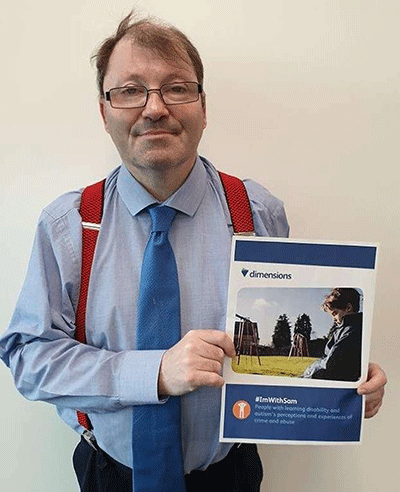Disability hate crime law needs tightening up to take in ‘mate crime’.
That’s the view of not-for-profit care provider Dimensions.
The organisation wants a shift in disability hate crime law.

Dimensions campaigns advisor Mark Brookes believes hate crime laws should be tightened up
Under existing law, offenders often escape prosecution for hate crime if crimes can be put down to the person’s vulnerability.
Disability hate crime ‘needs redefining’
But in a new report, Dimensions argues that hate crime law needs to move into line with civil law definitions of disability discrimination.
The report suggests the guiding principle should be whether offenders target the victim because of their disability.
In an online survey, Dimensions found 64 per cent of respondents with a learning disability or autism said they had been the target of crime or abuse.
The victims strongly agreed that the choice to target them was based on prejudice.
Up to 82 per cent of victims said people assumed they were an easy target. An even greater proportion (86 per cent) believed they were targeted because people saw them as different.
Story of Richard
In their report, #ImWithSam, Dimensions highlights the story of Richard.
The report says that Richard, who has a learning disability, reported a number of hate crimes to the police. However, Richard said the police told him he needed “an appropriate adult with him to file a report”.
But this only applies to offenders with learning disabilities or autism.
Richard has lost confidence in reporting hate crimes.
Mark Brookes is Dimensions’ campaigns advisor.
‘Lived in fear for too long’
Brookes, who himself has a learning disability, said people with learning disabilities have lived in fear for too long.
He said the justice system should take them seriously so it “works for everyone”.
A Home Office spokesperson told Autism Eye: “We are committed to tackling hate crime in all of its forms – including abuse of disabled people.
“We welcome the fact that more victims are having the confidence to come forward and report this despicable abuse, and it’s vital that their cases are properly investigated.
“We know about the concerns raised by some stakeholders on legislation, which is one of the reasons why we have asked the Law Commission to conduct a full review.”
In 2017/18 the police recorded 94,098 hate crimes, which represented a rise of 17 per cent on the previous year. The Home Office said this was largely due to improved police recording. It added that the figure also recognised spikes following incidents such as terrorist attacks, as well as more victims coming forward to report.
Related:
- Call to educate young to stop hate crime
- Appeal to media to be more responsible
- Bullying causes delayed depression
Published: 16 October 2019















